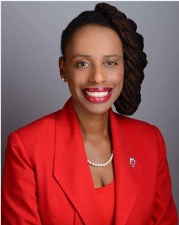HERS ALUMS
Biography
Congratulations to Dr. Stewart, an alumna of the HERS Institute at Bryn Mawr (2015), on her recent appointment to President of the Institute for Clinical Social Work located in Chicago, Illinois. She will assume her duties starting on July 1, 2019. Dr. Stewart will be leaving her positions as Vice President for Academic Affairs and Associate Professor of Sociology at Lane College (TN), where she spent 12 years advocating for academic excellence, social justice, and sustainable community engagement and development.
While Dr. Stewart prepares for her new leadership role, we were honored to sit down with her and reflect upon her HERS experience and how it helped inspire her career trajectory within higher education.
Alum Q&A
What did you value most during your time with HERS?
One of the things I most valued was the unique opportunity to complete a mock job interview with a professional search firm that specialized in higher education. This provided me with hands-on experience with industry professionals of what I could expect when participating in job interviews focused on leadership roles in higher education. I also found incredible value in a specific session that focused on working with the media. To this day in my career, I’ve never forgotten what the media expert advised us on, which was to be prepared to get the institution’s message across, to be repetitive in your messaging and not to be deterred by the interviewer’s questions. This is a strategy I have used in multiple interviews since participating with HERS. Though I understand the HERS Institute curriculum has changed since I went alum, these are simply mere examples of the amazing skills I was able to acquire while attending the program offering that helped influence my leadership journey.
How was the HERS experience different than other leadership development organizations you’ve participated in?
What’s truly unique about HERS is the format of the leadership programming it offers. For example, I participated in the HERS Institute, which was a two-week immersion program, during the summer of 2015 at Bryn Mawr College in Pennsylvania. Many leadership programs available in higher education are much shorter, but I believe the length of the HERS programming is advantageous, as I was able to soak up the experience and take the appropriate time needed to work through all aspects of the curriculum.
Also, because HERS is the only organization that provides leadership development opportunities solely for women in higher education, the curriculum was uniquely tailored to women. For me personally, sometimes the most straightforward advice is the best advice and that was the case at HERS. In fact, I still have my HERS portfolio, and in one of the first presentations by the HERS leadership team we were given the following advice: “If you are going to lead, lead.” That simple message was transformational for me, empowering me to own my (then) current position of Vice President of Academic Affairs and go back to my institution and lead academic affairs with confidence. It also motivated me to assist others throughout the institution in developing the capacity and confidence to lead.
Another important aspect of the format and experience is a participant’s introduction to the HERS Network, which allows for the opportunity to form meaningful bonds with women across the higher education sector. Coming out of the experience with a built-in cohort of women I could look to when I needed them was incredibly empowering.
How did HERS pique your interest to work toward a presidential role at an institution?
I think it was the motivational aspect of the program that helped to encourage me to begin thinking about the presidency. Prior to HERS, I viewed myself as an assistant; someone who assisted others in their leadership roles and in leading the institution. HERS helped me to ask and answer the question, “Why not me?” It was also at HERS that I developed a plan outlining the experiences and additional skills that I would need to develop prior to searching for a presidential role at an institution. HERS encourages women to be confident, to embrace their skills and abilities, and to have the courage to lead by engaging in several powerful exercises that provide the transformational experience many women are looking for.
What advice would you give to a woman in higher education who wants to advance their career?
To help them take responsibility for their career advancement, I would provide the following advice:

As one of our partners, you can be a leader behind much-needed change in the educational sector. Support for our programs drives leadership equity, enabling institutions to better support an increasingly diverse student body and better prepare their students to create a more equitable society.